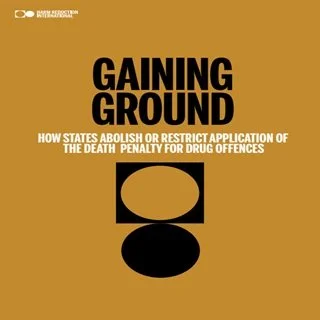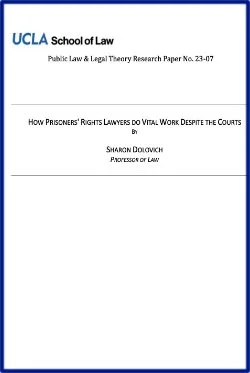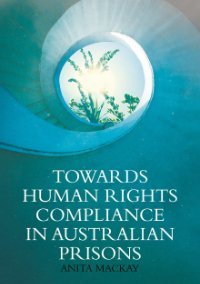By Giada Girelli
The death penalty is an ineffective and inhumane punishment, and a prohibited one when imposed for drug offences. Still, as of 2024 it is retained in over 30 countries, and its implementation as a tool of drug control is a key driver of the use of capital punishment worldwide. At a time when its use is intensifying, by the part of an increasingly restricted but radical group of countries, it is critical to interrogate why and how governments around the world have abolished this measure or taken steps towards reducing its application. Such an assessment is key to understanding which actors and factors – social, political, cultural, economic – have influenced these processes, and which legal and policy steps were adopted to achieve that goal. In turn, this can offer important lessons to advocates, policymakers and practitioners on effective pathways to remove or restrict the application of the death penalty for drug offences in practice; as a step towards total death penalty abolition, and towards drug policies centred around dignity, health and rights. After a brief overview of the death penalty for drug offences, which builds upon Harm Reduction International (HRI) The Death Penalty for Drug Offences: Global Overview series (hereinafter: Global Overview), this report is divided into two main parts. The first one is a review of 17 case studies of countries and territories which have removed the death penalty for drug offences from their laws, or adopted reforms aimed at reducing its use. The second is an analysis of commonalities in and recurring features of these experiences, with a focus on agents of change, narratives, other influencing processes, and the role of transparency. The report closes with some recommendations for policymakers, experts and activists, building on the lessons that can be learnt from these case studies. 1. 2 OBJECTIVES AND METHODOLOGY This report reviews and analyses case studies of national developments which aimed to or had the effect of removing or restricting the use of the death penalty for drug offences. A primary purpose is to provide a comparative review of driving forces that practitioners and abolitionist activists can draw upon to develop strategies aimed at restricting use of the death penalty for drug offences in their own country. Attention is thus limited to (a) countries and territories with laws prescribing death as a punishment for drug offences at some point in their history; and (b) legal, policy, judicial or other developments which had at least the potential of restricting the use of this punishment; considering developments related to the death penalty for drug offences specifically, as well as developments related to the death penalty generally in countries where this punishment was prescribed for drug crimes. The death penalty is an ineffective and inhumane punishment, and a prohibited one when imposed for drug offences. Still, as of 2024 it is retained in over 30 countries, and its implementation as a tool of drug control is a key driver of the use of capital punishment worldwide. At a time when its use is intensifying, by the part of an increasingly restricted but radical group of countries, it is critical to interrogate why and how governments around the world have abolished this measure or taken steps towards reducing its application. Such an assessment is key to understanding which actors and factors – social, political, cultural, economic – have influenced these processes, and which legal and policy steps were adopted to achieve that goal. In turn, this can offer important lessons to advocates, policymakers and practitioners on effective pathways to remove or restrict the application of the death penalty for drug offences in practice; as a step towards total death penalty abolition, and towards drug policies centred around dignity, health and rights. After a brief overview of the death penalty for drug offences, which builds upon Harm Reduction International (HRI) The Death Penalty for Drug Offences: Global Overview series (hereinafter: Global Overview), this report is divided into two main parts. The first one is a review of 17 case studies of countries and territories which have removed the death penalty for drug offences from their laws, or adopted reforms aimed at reducing its use. The second is an analysis of commonalities in and recurring features of these experiences, with a focus on agents of change, narratives, other influencing processes, and the role of transparency. The report closes with some recommendations for policymakers, experts and activists, building on the lessons that can be learnt from these case studies. 1. 2 OBJECTIVES AND METHODOLOGY This report reviews and analyses case studies of national developments which aimed to or had the effect of removing or restricting the use of the death penalty for drug offences. A primary purpose is to provide a comparative review of driving forces that practitioners and abolitionist activists can draw upon to develop strategies aimed at restricting use of the death penalty for drug offences in their own country. Attention is thus limited to (a) countries and territories with laws prescribing death as a punishment for drug offences at some point in their history; and (b) legal, policy, judicial or other developments which had at least the potential of restricting the use of this punishment; considering developments related to the death penalty for drug offences specifically, as well as developments related to the death penalty generally in countries where this punishment was prescribed for drug crimes. For these reasons, this report does not attempt to provide a comprehensive, exhaustive overview of all domestic developments in all relevant countries and territories which had the potential or effect to restrict recourse to the death penalty for drug offence. Rather, it only describes and reviews some relevant developments, selected based on their perceived relevance for practitioners and experts, as well as availability of sufficient information and access to informants.
London: Harm Reduction International, 2024. 70




















